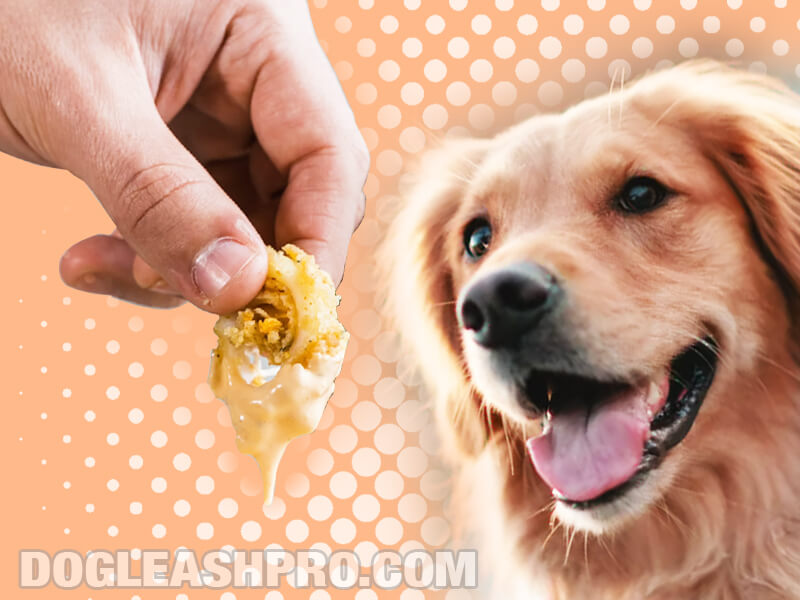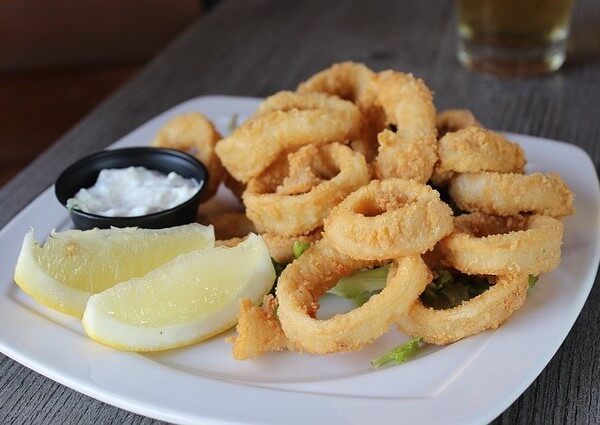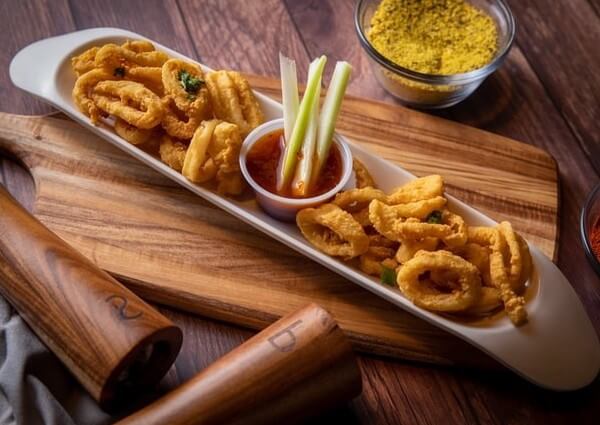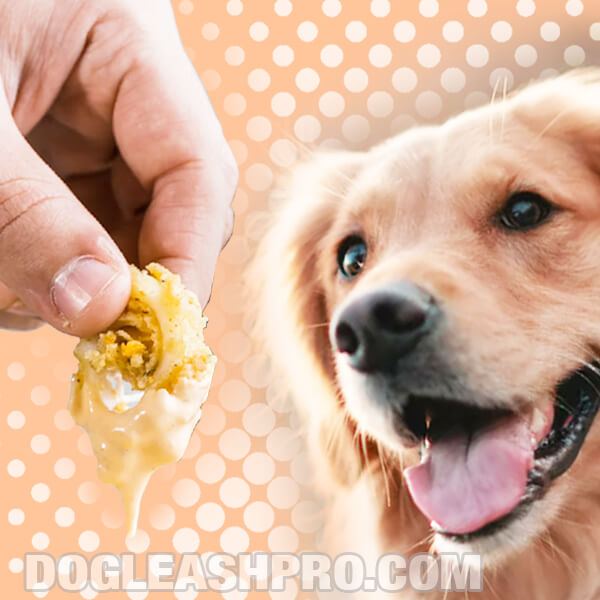
As I was adding Calamari to my seafood pasta dish this afternoon, I accidentally dropped a piece or two and it fell right onto my kitchen floor. Before I could even discard it, my Labrador ran in and chomped both Calamari down. I almost freaked and wondered, “Can dog eat Calamari?” Here’s the short answer first before we go into more detail.
Can dogs eat Calamari? Yes, dogs can eat Calamari in small amounts as a rare occasional treat as it is not toxic to dogs. However, dog owners should not feed their dogs Calamari regularly since breaded, sauteed, and deep-fried Calamari are high in saturated fats, sodium, and calories which can lead to a host of immediate and long-term health issues in dogs.
Table of Contents
Can dogs have Calamari?

Yes, dogs can have Calamari since this seafood is not toxic to dogs, however, it is recommended that dogs do not eat Calamari regularly or daily. That’s because many people in the US enjoy sauteed, grilled, or fried Calamari and due to how this seafood is prepared, it is unhealthy for canine consumption.
To fully understand why Calamari is bad for dogs, let’s take a look at what Calamari is and how this dish is prepared in the US.
What is Calamari?

While Calamari is an Italian word for squid which is a cousin to octopus. In the United States, Calamari refers to an appetizer that is lightly battered and deep-fried. While Calamari is a popular appetizer served in many bars and restaurants, many families also add this crunchy and delicious seafood to pasta, rice dish, soups, and risotto.
Calamari is the rings and tentacles of squid that have been deep-fried, grilled, or sauteed.
Here are the common ingredients in fried Calamari:
Ingredients for fried Calamari
- Calamari rings or Calamari tubes.
- Salt.
- Milk or buttermilk.
- All-purpose flour.
- Cornstarch.
- Baking powder.
- Dry oregano or chopped fresh parsley.
- Black pepper.
- Cayenne pepper.
- Grapeseed oil as needed.
- Paprika.
- Garlic powder.
- Vegetable oil for frying.
Next, let’s take a look at the typical nutritional profile of fried Calamari:
Nutritional Profile of cooked, fried Calamari (3oz or 85g)
| Name, Unit | Amount |
| Calories, cal | 149 |
| Sodium, mg | 260 |
| Carbohydrate, g | 6.62 |
| Total Fat, g | 6.36 |
| Saturated Fat, g | 1.6 |
| Protein, g | 15.2 |
| Calcium, mg | 33.2 |
| Iron, mg | 0.858 |
| Magnesium, mg | 32.3 |
| Phosphorus, mg | 213 |
| Potassium, mg | 237 |
| Zinc, mg | 1.48 |
| Copper, mg | 1.79 |
| Manganese, mg | 0.06 |
| Selenium, µg | 44 |
| Vitamin C, mg | 3.57 |
| Thiamin, mg | 0.048 |
| Riboflavin, mg | 0.389 |
| Niacin, mg | 2.21 |
| Vitamin B-6, mg | 0.049 |
| Folate, µg | 11.9 |
| Vitamin B-12, µg | 1.04 |
| Vitamin A, µg | 9.35 |
As we can see, in just 3oz of fried Calamari, there are 149 calories, 6.36 grams of fat (1.6 grams saturated), 6.62 grams of carbohydrate, and a whopping 360 mg of sodium. This means that regularly eating Calamari can harm our canine friend’s health.
So, can dogs eat fried Calamari?
No, dogs should not eat fried Calamari regularly or daily. Looking at both the ingredients and the nutritional profile of fried Calamari, we can see that this is not the type of human food we should share with our pooch regularly.
Fun Fact: Donuts are mainly made of flour dough among other ingredients and they are deep-fried in vegetable oil like canola oil so are they safe for doggy consumption? Check out Can Dogs Eat Donuts? to find out!
High sodium levels in fried Calamari can lead to salt poisoning in dogs
It’s very easy for our canine friends to chomp down 3oz or 85 grams of fried Calamari and in this amount of Calamari, there is 260mg of sodium.
Keep in mind that our furry friends only need between 0.25 and 1.5 grams of salt for every 100 grams of food. This means that they should receive their daily salt intake from their regular well-balanced and healthy diet. Any salt intake over this amount can lead to sodium poisoning.
If your pooch already satisfy his daily salt intake from his regular food and is still eating fried Calamari, then they will experience the following symptoms of salt poisoning:
- Dehydration.
- Extreme thirst.
- Frequent urination.
- Swollen lips and tongue.
- Nausea.
- Vomiting.
- Watery and loose diarrhea.
- Loss of appetite.
- Headache.
- Fluid buildup.
- Fever.
- Muscle spasms.
- Body weakness.
- Upset stomach or stomach pains.
- Breathing difficulty.
- Tachycardia or increased heart rate.
- Walking around with a limp or abnormal gait.
- Lethargy or lack of energy.
You may be interested in: My Dog Is Acting Drunk And Wobbly – Should I Be Concerned?
If you suspect your dog has salt poisoning from accidentally eating a lot of fried Calamari, we highly recommend that you contact your vet as soon as possible. Sodium poisoning requires immediate medical attention and the sooner this condition is treated, the better.
Your dog’s vet will perform a thorough physical examination, blood tests, and urinalysis to find out your pup’s sodium level. In some cases, the vet may also perform a complete cardiac examination as well as the following:
- Radiographs or x-rays.
- EKG or electrocardiogram: measures the electrical impulses in your dog’s heart.
- CT scan.
- MRI.
- Ultrasound to find out if your dog’s lungs, heart, and brain were damaged by the high salt intake.
Once the vet has determined that your pooch has sodium poisoning, they may put your dog on IV fluid therapy, oxygen, and electrolytes to combat dehydration.
High-fat content in fried Calamari can cause dogs to develop pancreatitis
Fried Calamari is breaded and fried and fried food, in general, is bad for doggy consumption. When food like Calamari is fried, it contains a high-fat content. Additionally, there is saturated fat.
When our furry friends suddenly eat a lot of high-fat food, especially when they don’t eat high-fat food on a regular basis, they can start to develop pancreatitis. That’s because high-fat food like fried Calamari can cause your dog’s pancreas to become inflamed and this condition can be painful.
Dogs with pancreatitis may start to have diarrhea regularly and vomit more than usual. They may have depression, fever, and even painful abdominal pain.
A high-fat diet such as fried Calamari is especially terrible for dogs that are overweight or are on a weight management plan because a high-fat diet usually means that it is also high in calories.
As we can see, there are 149 calories in just 3oz or 85 grams of fried Calamari. While that may not seem like a lot of calories for us, it is definitely a lot of calories for our four-legged friends.
If your pooch doesn’t regularly eat a high-fat diet and all of a sudden eats a lot of fried Calamari, there’s a possibility that he or she may also get diarrhea.
Dogs with the following health issues or conditions should avoid a high-fat diet or food such as fried Calamari:
- Diabetes.
- Gastrointestinal issues.
- Pancreatitis.
- High levels of fat in their blood.
Fried Calamari is high in carbohydrates which put pressure on your dog’s digestive system
Since our canine friends are carnivores, they don’t require that many carbohydrates in their daily diet in order to survive. Instead, a healthy doggy diet should be high in protein and healthy fats.
Dogs also lack the amylase enzyme in their saliva to break down starch and when they eat tons of fried food that has been breaded with flour (high in carbs) and deep-fried in vegetable oil, it puts a lot of stress on their digestive system and this could lead to many health issues such as diabetes, obesity, and even cancer.
DISCLAIMER: THIS WEBSITE DOES NOT PROVIDE MEDICAL ADVICE
The information, including but not limited to, text, graphics, images and other material contained on this website are for informational purposes only. No material on this site is intended to be a substitute for professional veterinary advice, diagnosis, or treatment. Always seek the advice of your veterinarian or other qualified health care provider with any questions you may have regarding dietary needs.
Resources:
https://simple.wikipedia.org/wiki/Calamari
https://www.petpoisonhelpline.com/poison/salt/

With over five years of specialized experience as an animal writer, my expertise lies in dog nutrition, health, behavior, grooming, and training. I am dedicated to delivering helpful and informative content that caters to the well-being of our furry friends. My primary goal is to empower pet owners with knowledge and ensure our canine companions thrive in health and happiness. In my free time, I love volunteering at local dog rescue centers.







